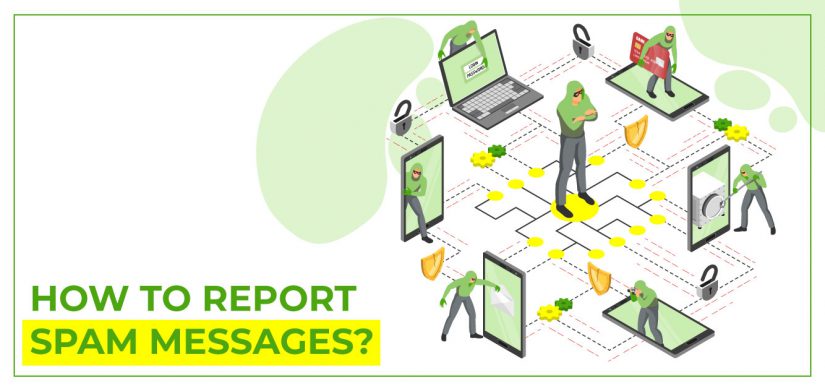
How to report Spam Messages?
While texting marketing is a very safe and efficient channel, it comes with its cons. People can opt into the business of their choice and receive relevant messages. However, as a receiver, perhaps the worst thing that you go through is spam messages. Spam messages can be annoying, and they are illegal too.

Spam messages are either to unethically market a business. Or they bring a threat. They may be to collect numbers and data for identity theft, increase mailing lists, or other forms of unethical practices.
Here is everything you should know to control spam.
How to recognize spam?
Spam texts do not shout and tell you that they are spam. They may look normal and sometimes, they may be more believable than the real thing. Here is how you can recognize these messages and avoid taking any action that may compromise your safety.
- Promising messages
Spam messages are generally very creative and promising. These promises can be of prizes, cash prizes, discounts, coupons, or anything in general. Against these promises, you are required to do something very menial. This can be replying to a text, sending a message on another number, or anything else.
These messages are tricky. Hence, it is important to remember never to give out your personal information or social security number to anyone. Even if you know them. Especially, never give them out over messages, emails, letters, or any form that is easy to document. - Unbelievable claims
If you receive a message that seems too good to be true, chances are, it is too good to be true. One of the oldest tricks in the spam book is to make claims. These claims can range from something little to something huge. The most basic ones are low-interest credit cards, easy loans, free house maintenance, or more like them. All these claims are false and you should never act on them.
One of the most enticing messages is the promise to help pay off student loans. A lot of people tend to fall for these messages and end up doing more harm to their case. - Reports of suspicious activity
A very concerning thing is suspicious activity. This can be of something as little as for a social media account. Or, it can be on your credit card or something like that. It is important to be mindful of these situations. However, spam messages take advantage of the vulnerability and use it to gather intel on you. If you ever receive a message that alarms you, the best way to deal with it is to call the authority directly. For example, you can call your bank or visit it to ask them.
However, never respond to the message or do anything that the message asks you to do. A simple reply can be quite dangerous. - Claim a problem
Spamming is pretty smart these days. Spammers generally target a generic problem and claim to have the solution to it. They may tell you that your last transaction was failed, or your credit card needs replacement. Similarly, they may claim that you need to verify your card by sending its number. Ignore all these messages and instantly take action to get them off your back. - Send invoices
Who likes getting robbed? Spam messages can also send you an invoice for a transaction that you did not make. These trigger a concern in people. They generally just send a simple no or take the action in the message.
The simplest solution to avoid chaos is to call your bank. They can guide you better. Moreover, you can know that the message was fake and can take action against it.
How to report Spam?
When you recognize a text as spam, you need to take immediate action. Here are some actions you can take.
- Block messages on your phone
The first thing and most basic thing you can do is to block these messages on your phone. Almost all smartphones have the option to block numbers that you do not want to receive messages from. You can simply block these numbers and seldom see them again. - Block through a third-party app
If your phone does not have this option, you can still do something about it. There are plenty of third-party applications that help you block the sender. Simply install one of these apps and block the sender immediately. - Contact your wireless carrier
Blocking the senders does the job for you. However, they are not the permanent solution to the problem. Reporting spam is important to ensure the safety of everyone. Contact your wireless carrier and tell them about the spam messages. Most of the major networks have their automated system to report spam. Look out for them and use them.
When you report spam to the carriers, they are obligated to investigate the messages. Moreover, the number and business may even get blacklisted as a penalty. - File a complaint with the FTC
The Federal Trade Commission is the main agency to take action against spam reports. If spam is getting out of control for you, then you can and should report it immediately.
The agency tracks the patterns of spam messages and takes serious action. Moreover, they may take legal action to ensure that receivers are as protected as possible. If you’ve lost money, then you may also have to file a complaint in your precinct. However, the agency does not get you your money back.
Bottom line
Spamming is a serious threat. If you are getting spam texts, then you may just be getting annoyed. However, there is a bigger picture that requires you to report spam messages so that you can save yourself and others from serious consequences.
To ensure that mass texting is as clean as possible, ExpertTexting encourages and strictly adheres to the policy of express written consent only. Signup today, to begin mass texting.
